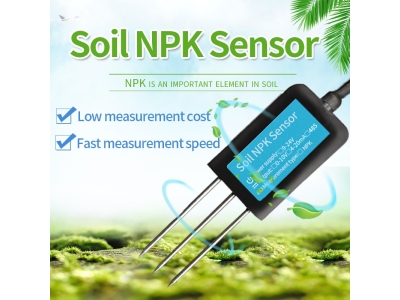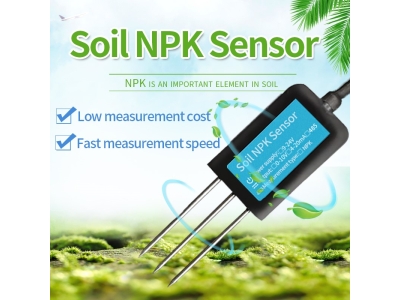Agriculture is one of the world's oldest and most important industries. Over the centuries, farmers have relied on their knowledge and experience to produce crops and feed the world's growing population. However, the past few decades have seen dramatic changes in agricultural practices, driven by technological advancements. One such technology that has revolutionized farming practices is soil sensor technology. Smart farming, which leverages the power of soil sensors, is transforming crop production worldwide. In this article, we will explore the definition of smart farming, the benefits of soil sensors, applications of smart farming in agriculture, and future prospects for this innovative technology.
Definition of Smart Farming :
Smart farming refers to the use of modern information and communication technologies (ICT) to optimize agricultural production and farming processes. It is also known as precision agriculture, a term that describes the use of data-driven methods for crop management. Smart farming involves the integration of various technologies that enable farmers to make informed decisions about crop production. One such technology is soil sensor technology, which provides real-time information about soil parameters such as moisture, temperature, and nutrients. These sensors allow farmers to monitor crop growth and health, predict yields, and adjust agronomic practices accordingly. Smart farming also encompasses other aspects of precision agriculture, such as using drones and satellite images for crop monitoring, automated irrigation systems, and precision application of fertilizers and pesticides.

Benefits of Soil Sensors :
Soil sensors offer numerous benefits to farmers and the environment that contribute to sustainable crop production. Let's explore some key advantages of soil sensors:
a. Optimal Resource Allocation: Soil sensors provide accurate information about soil parameters, enabling farmers to optimize resource allocation. By knowing exactly how much water and nutrients the crops need, farmers can apply resources more efficiently, reducing waste and increasing yields.
b. Cost Savings: Soil sensors help farmers to save costs by reducing input usage, such as water, fertilizers, and pesticides. This leads to lower operating costs, increased profitability, and a more sustainable farming model.
c. Water Conservation: Soil sensors enable efficient water management by providing real-time soil moisture data. This helps farmers to apply water precisely when and where needed, reducing water wastage and conserving this precious resource.
d. Environmental Protection: Precision agriculture facilitated by soil sensors promotes sustainable farming practices. By reducing water and chemical usage, it minimizes the risk of water pollution, soil erosion, and the release of greenhouse gases.
e. Improved Crop Quality: Soil sensors enable farmers to monitor plant health, diagnose issues, and adjust agronomic practices accordingly. This results in improved crop quality, higher yields, and enhanced profitability.
f. Climate Resilience: Soil sensors enable farmers to adapt to climate change by providing real-time data on soil conditions. By understanding how soil moisture, temperature, and other factors are changing, farmers can adjust their practices accordingly and mitigate climate-related risks.
Applications of Smart Farming in Agriculture :
Smart farming has a wide range of applications in agriculture. Here are some key areas where soil sensors and other precision agriculture technologies are transforming farming practices:
a. Irrigation Management: Soil moisture sensors play a vital role in optimizing irrigation practices. By providing real-time data on soil moisture levels, farmers can precisely determine when and how much to irrigate. This helps in reducing water wastage, improving crop yield, and conserving water resources.
b. Nutrient Management: Soil nutrient sensors enable precise nutrient management, ensuring that crops receive optimal nutrition. By monitoring nutrient levels in the soil, farmers can adjust fertilizer application rates and timings, minimizing nutrient waste and environmental pollution.
c. Crop Health Monitoring: Soil sensors help in monitoring soil temperature, pH, and salinity levels, which directly impact crop health. By tracking these parameters, farmers can identify potential issues early on and take corrective measures to prevent crop diseases, nutrient deficiencies, or toxicity.
d. Yield Prediction: Soil sensors, along with other environmental sensors, contribute to yield prediction models. By integrating data from soil sensors with weather data and crop growth models, farmers can make accurate predictions about crop yields. This information aids in planning harvest and marketing strategies.
e. Variable Rate Application: Soil sensors allow for variable rate application of inputs, such as fertilizers and pes






